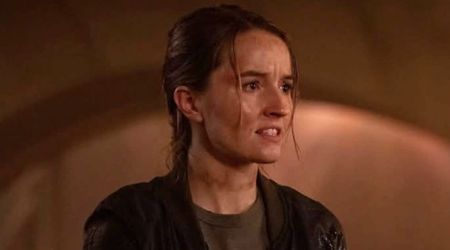'Flannery': How Flannery O'Connor's friendship with the Fitzgeralds made her a literary legend after her death

Flannery O'Connor is one of the greatest fiction writers to have emerged in the 20th century. Her works were characterized by her gothic portrayal of the rural American South, and her use of dark humor in her work to depict the greatness as well as the ugliness of human nature in a way that arrested people's attention. She was a devout Catholic who wrote impactful works that compelled her readers to confront reality. O'Connor's faith made its presence known in her penmanship, where she highlighted topics like alienation, the relationship between individual god, combining it with Catholic themes like grace and redemption. While she wasn't a prolific writer, she has two novels and a collection of short-stories comprising 39 works. Her life and career is the subject of an award-winning documentary film, 'Flannery' which will have its virtual cinematic release, today.
In the summer of 1949, O'Connor was in need of a change in scenery to finish her first novel 'Wise Blood'. At the time, she thought that she had to get out of Georgia, where she was born and raised, to make significant achievements in her work. Through New York contacts, O'Connor was introduced to Robert Fitzgerald, the famed poet and translator and his wife Sally, who owned a garage apartment in Ridgefield, Connecticut. She rented the room and basked in the serene and conducive environment of the location that helped her in her writing. She boarded there for nearly two years and established life-long friendships with the Fitzgerald's particularly Sally, who became her best friend and confidante until O'Connor's death.

One of the reasons that she got along so well with the Fitzgeralds was because they also were Catholics, strong in their belief and provided her with the balance of solitude and communion that proved necessary for her creativity and her intellectual and spiritual life. She would write in her room and discuss her writing gaining insights and pointers from Robert over the dinner table while indulging in her friendship with Sally. A homemaker and occasional book reviewer, Sally once considered adopting a nun's life until she met Robert while in the navy. Robert was a poet and translator by profession, who was best known for translating ancient Greek and Latin. In December 1950, O'Connor complained to the couple of feeling ill and decided to move back home to Georgia. She was diagnosed with lupus, an autoimmune disease that she had inherited from her father who had died when she was young, which was then treated with the use of steroid drugs. The first time she was hospitalized, she survived a life-threatening attack, but thereafter she spent most of her time as a recluse confined to her family's farmhouse at Andalusia, near Milledgeville, Georgia.
From then on she focused on her writing and even made occasional trips to lecture and read from her works. During this time most of her contact with the Fitzgerald family was by correspondence through letters, which were collected and compiled by Sally and became the body of the book 'The Habit of Being'. The book was published after O'Connor's passing and also included letters from Robert Lowell, Elizabeth Bishop, John Hawkes, Elizabeth Hardwick, Walker Percy and others. A 1964 surgery for a fibroid tumor reactivated O'Connor's lupus which had been in remission and her condition only worsened as she suffered complications from the disease. She died on August 3, 1964, after several days in a coma.
Sally met the writer in-person only three other times since she had moved out of Fitzgerald's home, the last being in Italy in 1958. The family had moved there when Robert was translating Homer's 'Odyssey'. After O'Connor's death, Sally carefully curated the letters that the writer had addressed to her and despite not having a strong literature background, wrote a sensitive introduction and connecting passages. She even preserved O'Connor's misspellings and explained that “to have corrected them would have destroyed some of the savor,” per the Los Angeles Times. Sally was offered the chance to publish the compilation of letters, amid her divorce. She was distraught over the end of her 25-year marriage to Robert, who by then, an acclaimed professor had left her for a younger woman. She took a part-time job at Harvard law school and focused her attention on the letters. However, she faced another major setback when the briefcase carrying the original letters was stolen. She ended up finding them behind a patch of rhododendrons in her garden, where they had been “scattered . . . over the face of the dewy earth”, she told the Washington Post in 1980. “It was a miracle I got them all back," she added.
She finally finished the book and 'The Habit of Being' was published in 1979, garnering rave reviews. The letters revealed a lot about O'Connor from her life in Milledgeville, her writing habits, and her profound religious convictions. The readers were given an unvarnished look at the author that has entranced them with her shocking stories, and they were able to see the warm and witty personality of an intellectual writer. It went on to receive numerous awards and Christian Century magazine deemed 'The Habit of Being' as one of the twelve most influential religious books of the decade.










